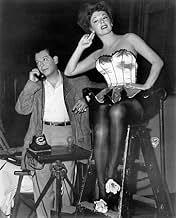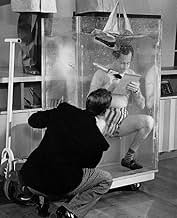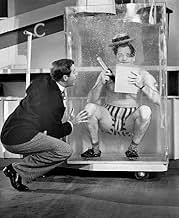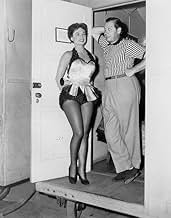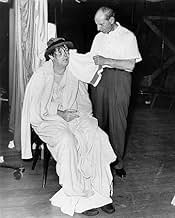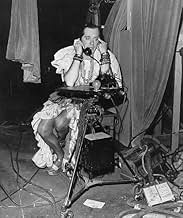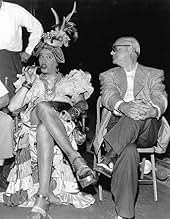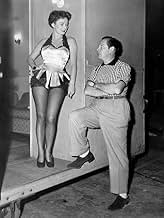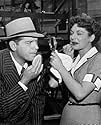Ajouter une intrigue dans votre langueA young comic plays second-rate nightclubs and chintzy resorts in his struggle to break into the big time.A young comic plays second-rate nightclubs and chintzy resorts in his struggle to break into the big time.A young comic plays second-rate nightclubs and chintzy resorts in his struggle to break into the big time.
- Réalisation
- Scénario
- Casting principal
Richard Avonde
- Minor Role
- (non crédité)
Edward Biby
- Smoker
- (non crédité)
Avis à la une
Probably not intended as such in 1949, in retrospect this film shows an interesting juncture between old time show biz and the imminent influence of television, which changed everything. The film captures some fascinating relics of an earlier time, such as Bert Lahr reprising a famous burlesque-type routine of his from the early '20s. Milton Berle excels in acting out all sorts of comedic styles and formats then in vogue or already seen as passe. Despite its chirpy title song, the film has a surprising toughness and unsentimentality for its era (witness the happily cruel "Men's Club" scene). Recommended for those into show biz history, and also a great way to see some genuinely funny stuff.
Robin Williams, Tom Hanks, and Jack Lemon. I bet you can think of others.
Unfortunately, Berle ain't one of them. Bert Lahr doesn't do so well either.
It is great to see some of his old acts but some of them don't hold up.
Unfortunately, Berle ain't one of them. Bert Lahr doesn't do so well either.
It is great to see some of his old acts but some of them don't hold up.
My favorite comic will always be Uncle Miltie and he was a scream in this one. Hammy and corny beyond belief, this slapstick had me rolling on the floor. The story involved a up and coming third rate comic trying to break into big time show biz. He must first work second rate clubs and resorts, but finally gets his big shot when taking over a routine for a fellow actor. Lots of good hoofing, sight gags, and joking around in the famous Berle style.
I happened upon this film by accident whilst I was channel surfing. Having never seen "Uncle Milty" in an acting role before I just had to stop and watch.
While this films story is one of those behind the scenes show biz stories of a comic trying to get into the big time, what I found to be absolutely fascinating was the character of Rene played by Iphigenie Castiglioni in what can only be read as a very, very lesbian night club owner for whom Berle auditions doing a comedic routine playing the piano and singing Miss Otis Regrets, a song written by the very gay Cole Porter.
The nightclub owner Rene with her mannish hairstyle, tuxedo (worn during the day!) and long, long cigarette holder with her aperitif is the quintessential gay stereotype for the era. How the combination of Rene in her garb and the suggestive Cole Porter song got past the censors is beyond me, but I am sure it was quite appreciated by gay audience members as an acknowledgment of their presence in show business.
While this films story is one of those behind the scenes show biz stories of a comic trying to get into the big time, what I found to be absolutely fascinating was the character of Rene played by Iphigenie Castiglioni in what can only be read as a very, very lesbian night club owner for whom Berle auditions doing a comedic routine playing the piano and singing Miss Otis Regrets, a song written by the very gay Cole Porter.
The nightclub owner Rene with her mannish hairstyle, tuxedo (worn during the day!) and long, long cigarette holder with her aperitif is the quintessential gay stereotype for the era. How the combination of Rene in her garb and the suggestive Cole Porter song got past the censors is beyond me, but I am sure it was quite appreciated by gay audience members as an acknowledgment of their presence in show business.
Le saviez-vous
- AnecdotesThe "Fountain Pen Sketch" was taken from the hit musical "Make Mine Manhattan" that opened in New York on 15 January 1948 at the Broadhurst Theatre, 235 W. 44th St. and ran for 429 performances, and starred Sid Caesar. Max Showalter, who performs that specialty number in this movie, was also in that opening night cast playing the same role, as well as others.
- GaffesAfter Kip meets with Eagen, a brief clip is shown of a train heading to Boston, with a Southern Pacific locomotive. The Southern Pacific Railroad served California and the south west, and would not have gone to Boston or anywhere in the northeast.
- Citations
Monte Wilson: [Checking out Kip's suit] Very conservative.
Kipling 'Kip' Cooper: Conservative? Why it could be elected on a Republican ticket without anyone in it.
- ConnexionsReferenced in Texaco Star Theatre Starring Milton Berle: Épisode #2.11 (1949)
- Bandes originalesAlways Leave Them Laughing
(1949) (uncredited)
Written by Sammy Cahn and Milton Berle
Sung during the opening credits and first scene by Lynn Davis, Lorraine Crawford,
Flo Farmer, Mary Castle, Alice Wallace and Nita Talbot
Reprised by them with Milton Berle at the end
Variations in the score throughout
Meilleurs choix
Connectez-vous pour évaluer et suivre la liste de favoris afin de recevoir des recommandations personnalisées
Détails
- Date de sortie
- Pays d’origine
- Langue
- Aussi connu sous le nom de
- The Thief of Broadway
- Lieux de tournage
- 1655 Broadway, Manhattan, Ville de New York, New York, États-Unis(Lindy's Restaurant, exterior)
- Société de production
- Voir plus de crédits d'entreprise sur IMDbPro
- Durée
- 1h 56min(116 min)
- Couleur
- Rapport de forme
- 1.37 : 1
Contribuer à cette page
Suggérer une modification ou ajouter du contenu manquant


